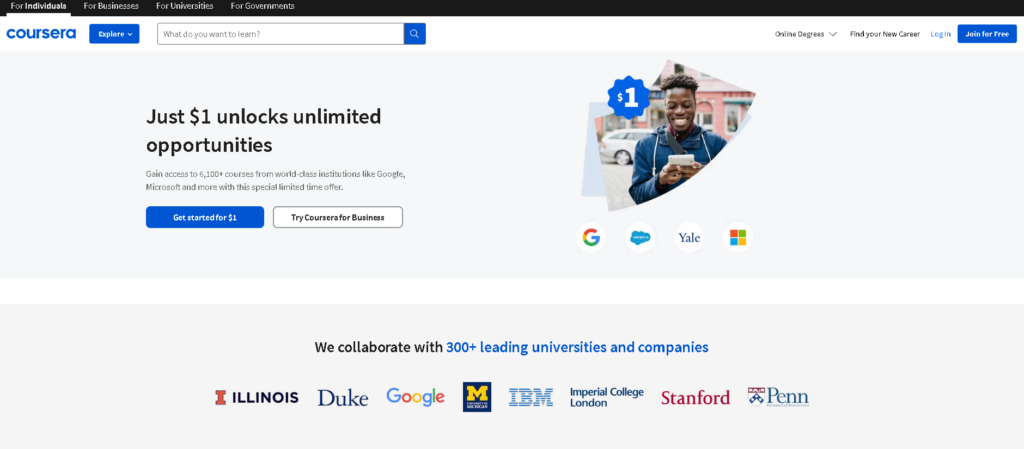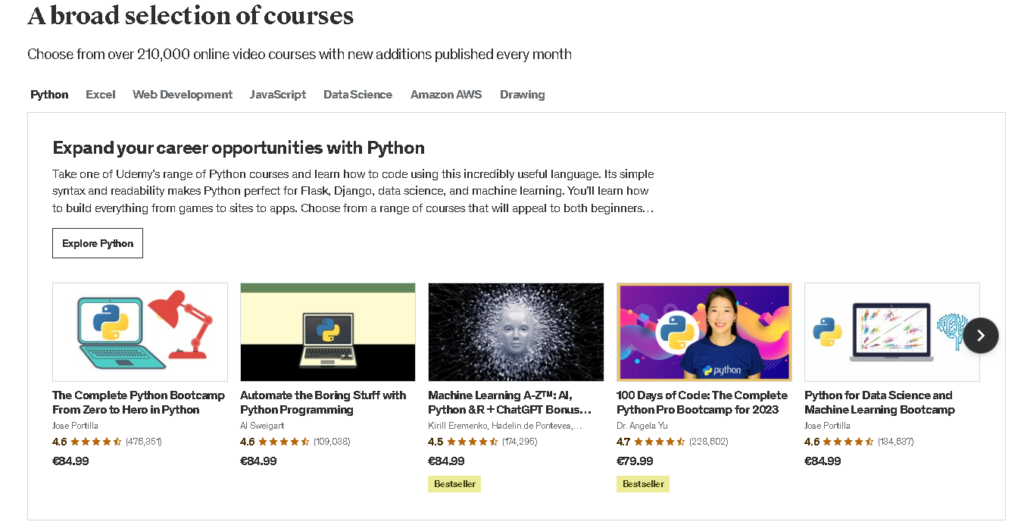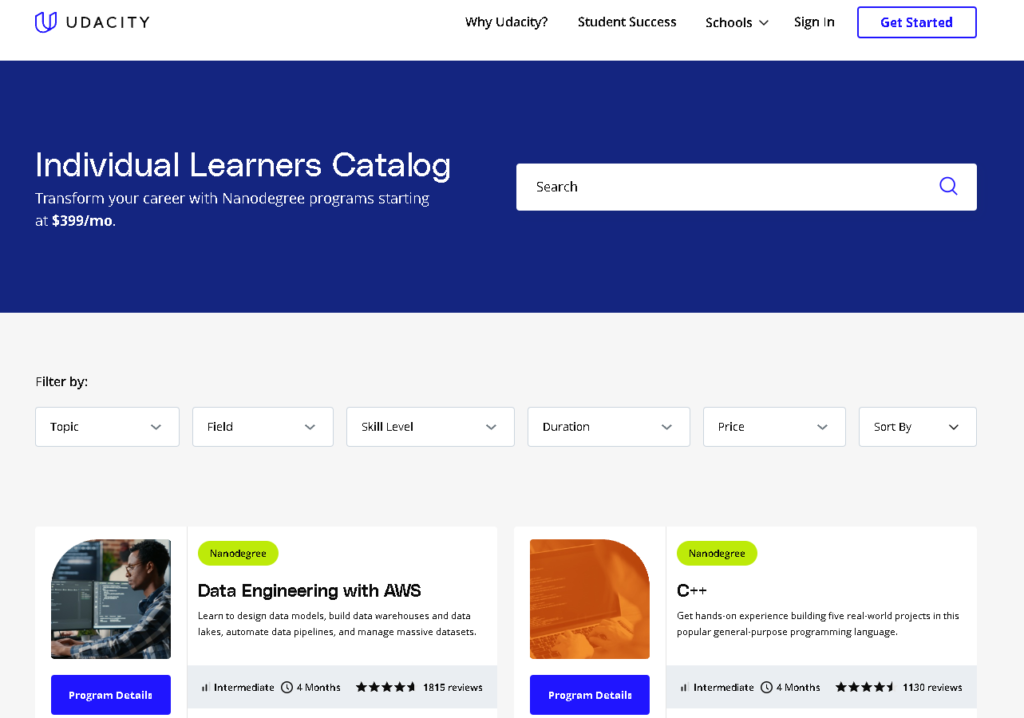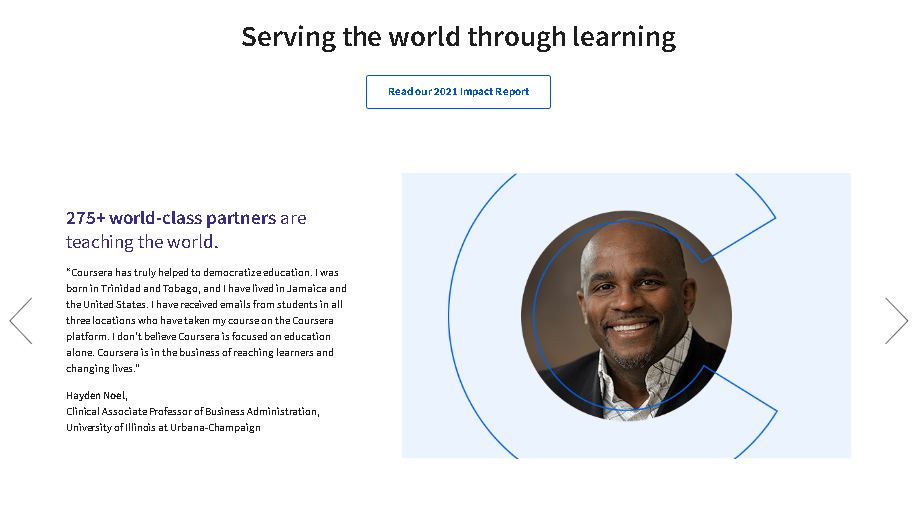In today’s fast-paced world, where continuous learning is a necessity, online education platforms have become essential tools for personal and professional growth.
Among all the options, Udemy, Coursera, and Udacity stand out as popular choices.
But, who wins the battle of Udemy vs Coursera vs Udacity?
In this blog post, we will delve into the comparisons of Udemy, Coursera, and Udacity, exploring their courses, features, pricing, and more.
Whether you’re a lifelong learner or seeking specific skills, this guide will help you navigate the online learning landscape.
This article is full and in-depth but if you are in a rush, the headlines are:
Udemy:
Udemy is an open marketplace for online courses with a vast and diverse selection. It’s known for its affordability and accessibility, making it suitable for those looking to explore a wide range of topics on a budget. Courses are created by experts worldwide, but course quality can vary. Udemy offers lifetime access to purchased courses, allowing self-paced learning.
Coursera:
Coursera partners with prestigious universities and organizations to provide structured and accredited courses. It’s ideal for learners seeking recognized certificates and academic rigor. Coursera courses often include video lectures, assignments, and peer-graded assessments. It’s a platform for those looking to pursue higher education and career advancement.
Udacity:
Udacity specializes in tech-focused courses and nanodegree programs, designed in collaboration with industry leaders. It offers practical skills and hands-on learning, making it an excellent choice for individuals looking to advance their careers in the tech industry. Nanodegree programs come with mentor support and industry-recognized credentials.
Let’s get right into the threesome comparison of Udemy vs Coursera vs Udacity.
Udemy vs Coursera vs Udacity in a Nutshell
Before we compare Udemy vs Coursera vs Udacity we must look at what the platforms are.
About Udemy

Udemy is a widely recognized online learning platform that offers a vast array of courses on various subjects. Founded in 2010, Udemy has grown to become a go-to destination for learners worldwide.
What sets Udemy apart is its marketplace-style approach, where anyone with expertise can create and publish courses. This leads to a diverse selection of courses, covering everything from programming and design to cooking and personal development.
With Udemy, you can typically purchase individual courses and access them for a lifetime, allowing for flexible self-paced learning. Udemy is known for its affordability and often features promotions and discounts on its courses.
About Coursera

Coursera is an online education platform that partners with top universities and organizations to provide high-quality courses and specializations. Established in 2012, Coursera focuses on delivering structured and accredited content.
The platform offers a wide range of courses, which are often designed by professors from renowned institutions. Coursera’s courses are typically part of larger specializations or even online degrees, allowing for a more comprehensive and structured learning experience.
Coursera also offers a subscription-based service called Coursera Plus, which provides access to a vast library of courses and specializations.
About Udacity

Udacity is an online learning platform with a distinct focus on technology-related courses and nanodegree programs. It was founded in 2012 and has gained recognition for its commitment to skill-based education.
Udacity collaborates with industry giants like Google, Amazon, and IBM to provide courses that are closely aligned with current job market demands. What sets Udacity apart is its nanodegree programs, which are more intensive and come with hands-on projects and mentor support. These programs are aimed at helping learners acquire practical skills for careers in areas like data science, artificial intelligence, and programming.
Udemy vs Coursera vs Udacity Courses
When it comes to online learning, the quality and variety of courses offered are paramount. Udemy, Coursera, and Udacity each bring something unique to the table.
Udemy Courses

Udemy boasts an impressive library of courses, with over 210,000 options in various categories. These courses are created by experts, enthusiasts, and professionals from around the world.
You’ll find courses on everything from coding and graphic design to yoga and cooking. What’s special about Udemy is that you can often find niche or specific courses on topics that might not be as prevalent on other platforms.
However, since anyone can create a course, quality can vary, so reading reviews and checking ratings is essential.
Best Udemy Courses
I’ve made a list of the best Udemy courses you can check out. Here are some of the most popular Udemy courses:
- “The Web Developer Bootcamp” by Colt Steele – A comprehensive course for aspiring web developers.
- “The Complete Digital Marketing Course” by Daragh Walsh – Ideal for those looking to master digital marketing techniques.
- “Photography Masterclass: A Complete Guide to Photography” – Perfect for photography enthusiasts at all levels.
Coursera Courses

Coursera takes a structured approach to its courses, partnering with top universities and organizations.
The courses on Coursera are designed by professors and experts, ensuring a high level of academic quality. They often come in the form of specializations or even full-fledged online degrees.
This means you get access to comprehensive learning experiences that include video lectures, assignments, quizzes, and peer-graded assessments. Coursera’s courses are particularly suited for those looking for accredited and structured learning.
Best Coursera Courses
Here are some of the best and highest-rated Coursera courses:
- “Machine Learning” by Stanford University – A renowned course that delves into machine learning algorithms.
- “Financial Markets” by Yale University – An insightful course for finance enthusiasts.
- “Learning How to Learn” by the University of California, San Diego – A popular choice for improving your learning techniques.
Udacity Courses

Udacity, on the other hand, specializes in tech-related courses and nanodegree programs. Their courses are designed to be highly practical, focusing on job market demands.
Nanodegree programs, in particular, stand out. These are more intensive and include hands-on projects and mentor support.
Udacity collaborates with industry giants, such as Google and IBM, to create courses that align closely with industry needs. If you’re looking to acquire specific skills for a tech career, Udacity’s courses are an excellent choice.
Best Udacity Courses
Here is a short list of some of the best Udacity courses they have to offer:
- “Data Analyst Nanodegree” – Great for those aspiring to work with data and analytics.
- “Artificial Intelligence Nanodegree” – Explore the world of AI and machine learning.
- “Full Stack Web Developer Nanodegree” – A comprehensive program to become a web developer.
Udemy vs Coursera vs Udacity Teachers and Course Quality
One of the critical factors in choosing the right online learning platform is the quality of instructors and the courses they offer. Let’s explore how Udemy, Coursera, and Udacity stack up in terms of teachers and course quality.
Udemy Teachers and Course Quality

Udemy adopts an open marketplace approach, which means that anyone with expertise in a subject can create and publish a course. While this approach results in a wide variety of course options, it also means that course quality can vary significantly.
On Udemy, you’ll find courses taught by professionals, enthusiasts, and experts from around the world. To assess course quality, it’s essential to read reviews, check ratings, and look for courses with high enrollments and positive feedback. In this way, you can find high-quality courses on Udemy that suit your needs.
Coursera Teachers and Course Quality

Coursera partners with top universities and organizations to offer courses that are designed and taught by professors and experts. This approach ensures a consistently high level of academic quality.
Coursera courses often include video lectures, assignments, quizzes, and peer-graded assessments, providing a structured and comprehensive learning experience. If you’re looking for courses that come with academic rigor and accreditation, Coursera is a solid choice.
Udacity Teachers and Course Quality

Udacity focuses on practical, job-ready skills in the tech industry. Courses are created in collaboration with industry leaders such as Google, IBM, and Amazon. What makes Udacity unique is its nanodegree programs. These programs are more intensive and include hands-on projects and mentor support.
While the emphasis is on practical skills, the courses maintain a high standard of quality. You’ll learn from instructors with real-world experience, ensuring that you gain skills that are directly applicable to your career.
Udemy vs Coursera vs Udacity Course Quality Comparison
- Udemy: The quality of Udemy courses varies, but you can find hidden gems with diligent research and user reviews.
- Coursera: Coursera offers consistently high-quality courses designed and taught by renowned professors and experts.
- Udacity: Udacity excels in providing practical, industry-relevant courses with a focus on hands-on learning and real-world application.
In summary, if you’re looking for a diverse range of courses and are willing to do some research, Udemy can offer excellent options. Coursera is ideal for those seeking accredited and structured learning from top institutions, while Udacity shines when it comes to hands-on tech-focused courses that align with industry demands. Ultimately, the choice depends on your learning goals and preferences.
Udemy vs Coursera vs Udacity Features
When choosing an online learning platform, it’s essential to consider the features they offer. Udemy, Coursera, and Udacity have their own unique features that cater to different learning styles and needs. Let’s delve into the distinct features of each platform.
Udemy Features
- Open marketplace with diverse course options.
- Lifetime access to purchased courses.
- Various course formats for self-paced learning.
- Frequent discounts and promotions.
Coursera Features
- Structured courses from top universities and organizations.
- Certificates and online degrees from accredited institutions.
- Flexible learning options, including free auditing.
- Coursera Plus subscription for access to a vast library of courses.
Udacity Features
- Nanodegree programs with hands-on projects.
- Industry-aligned courses in collaboration with tech giants.
- Mentor support and practical career-focused learning.
- Career services for job placement support.
Features Comparison:
- Udemy: Offers a wide variety of courses with lifetime access and affordable pricing. Great for self-paced learning.
- Coursera: Provides structured courses, certificates, and even online degrees from accredited institutions. Ideal for those seeking accredited and structured learning.
- Udacity: Specializes in practical, tech-focused courses with hands-on projects and mentor support, making it an excellent choice for those pursuing specific career skills.
In conclusion, the choice between Udemy vs Coursera vs Udacity will depend on your learning goals and preferences. Consider the features that align with your needs and the type of learning experience you seek.
Udemy vs Coursera vs Udacity Pricing and Refund Policy

The cost of online courses and the flexibility of pricing and refund policies are important factors to consider when choosing an online learning platform. Let’s examine how Udemy, Coursera, and Udacity handle pricing and refunds.
Udemy Pricing and Refund Policy
- Pricing: Udemy courses are individually priced, and the platform frequently offers discounts, making courses affordable. You pay for each course you enroll in. Prices can range from $10 to $200 or more, depending on the course’s complexity and content.
- Refund Policy: Udemy offers a 30-day money-back guarantee. If you’re not satisfied with a course, you can request a refund within the first 30 days of purchase. This policy provides some assurance to learners.
Coursera Pricing and Refund Policy
- Pricing: Coursera courses can be audited for free, but if you want graded assignments and certificates, you can choose to pay for a course. Coursera Plus is a subscription service that costs around $59 per month, providing access to a wide range of courses and specializations.
- Refund Policy: Coursera offers a 14-day refund policy for their paid courses. If you change your mind within 14 days of purchase, you can request a refund.
Check out my Coursera vs Udemy article to see more!
Udacity Pricing and Refund Policy
- Pricing: Udacity offers courses and nanodegree programs, each with its own pricing structure. Courses can range from around $200 to $1,000 or more, while nanodegree programs are typically priced on a monthly basis.
- Refund Policy: Udacity has a 7-day refund policy for its courses and nanodegree programs. If you decide that a course isn’t the right fit for you within the first week of enrollment, you can request a refund.
See also my Udacity vs Coursera article to see which one is better!
Pricing and Refund Policy Comparison:
- Udemy: Offers a wide range of courses with individual pricing and a 30-day refund window.
- Coursera: Provides free auditing, paid options, and a 14-day refund policy.
- Offers courses and nanodegree programs with a 7-day refund policy.
Udemy vs Coursera vs Udacity Pros, Cons, and Best For
Choosing the right online learning platform (see also my best Udemy alternatives article) can be a pivotal decision in your educational journey. To help you make an informed choice, let’s explore the pros and cons between Udemy vs Coursera vs Udacity, and determine which platform might be the best fit for you.
Udemy Pros, Cons, and Best For
Pros:
- Udemy boasts an extensive library with a wide variety of courses, from tech and business to lifestyle and personal development.
- Courses on Udemy are often budget-friendly, and frequent discounts make them even more accessible.
- Once you purchase a course on Udemy, you have lifetime access, allowing you to learn at your own pace.
- The open marketplace approach means courses are created by experts worldwide, offering a diverse range of perspectives.
Cons:
- As anyone can create a course on Udemy, the quality of courses can vary significantly.
- Udemy’s certificates may not always hold the same weight as those from accredited institutions.
- Udemy’s courses are often self-paced, which may not suit learners who prefer structured curricula.
Best For:
- Udemy is best for budget-conscious learners seeking a wide variety of courses on different subjects and are willing to do some research to find high-quality content.
Coursera Pros, Cons, and Best For
Pros:
- Coursera partners with renowned universities and organizations, providing structured and accredited courses.
- Completing Coursera courses can lead to certificates and even online degrees from accredited institutions.
- You can choose to audit courses for free or opt for paid enrollment with graded assignments and certificates.
- The subscription service offers access to a vast library of courses and specializations for a monthly fee.
Cons:
- Some Coursera courses can be more expensive, especially if you aim for certificates and degrees.
- Many Coursera courses have set start and end dates, which may not suit self-paced learners.
Best For:
- Coursera is best for those seeking accredited and structured learning from top institutions and are willing to invest in their education.
Udacity Pros, Cons, and Best For
Pros:
- Udacity specializes in tech-related courses and nanodegree programs, providing practical skills aligned with industry demands.
- Many Udacity courses include real-world projects, offering practical experience.
- Nanodegree programs come with mentor support, enhancing the learning experience.
- Udacity collaborates with industry giants, ensuring course relevance.
Cons:
- Udacity’s focus on tech means limited course variety outside of this sector.
Best For:
- Udacity is best for those looking to acquire specific tech-related skills and are eager for practical, industry-aligned education.
In conclusion, your choice of Udemy vs Coursera vs Udacity depends on your learning goals, budget, and preferences. Udemy offers affordability and diversity, Coursera provides structured learning and accreditation, and Udacity specializes in practical tech education. Assess your needs, and pick the platform that best suits your aspirations.
Udemy vs Coursera vs Udacity Certificates and Recognitions

Obtaining a certificate or recognition for your online learning achievements can be a significant motivator and a valuable addition to your resume. Let’s explore Udemy vs Coursera vs Udacity handle certificates and recognitions.
Udemy Certificates and Recognitions
- Certificates: Udemy provides a certificate of completion for each course you finish. These certificates are not accredited and are mainly for personal achievement or showcasing your newly acquired skills on platforms like LinkedIn.
- Recognitions: While Udemy certificates aren’t officially recognized by educational institutions, they may hold weight with some employers or clients who value practical skills. Their value largely depends on the specific course and the skills it covers.
Coursera Certificates and Recognitions
- Certificates: Coursera offers certificates upon course completion. These certificates are recognized and can be shared on platforms like LinkedIn to showcase your skills.
- Recognitions: Coursera collaborates with accredited institutions, so its certificates often carry more weight in academic and professional circles. They can be particularly valuable for career advancement.
Udacity Certificates and Recognitions
- Nanodegree Credentials: Udacity offers nanodegree programs that provide not only certificates but also nanodegree credentials. These nanodegree credentials are industry-recognized and carry significant weight in tech-related fields.
- Recognitions: Udacity’s nanodegree programs are designed in collaboration with tech industry giants, which means employers often view these credentials as a strong indicator of practical skills. They can enhance your job prospects.
Udemy vs Coursera vs Udacity Certification and Recognition Comparison
- Udemy: Offers certificates of completion that may hold value with certain employers or clients but are not accredited.
- Coursera: Provides accredited certificates that are recognized and respected in academic and professional circles.
- Udacity: Offers nanodegree credentials in collaboration with industry leaders, which are highly regarded and recognized in the tech industry.
Udemy vs Coursera vs Udacity Alternatives
While Udemy, Coursera, and Udacity are popular online learning platforms, there are other platform alternatives that may better suit your specific learning needs. Let’s explore three notable alternatives to these platforms.
Skillshare

- Focus: Skillshare is an online learning platform that primarily focuses on creative and practical skills. It offers a wide range of courses in subjects like graphic design, photography, writing, and more.
- Format: Skillshare offers a subscription-based model, granting unlimited access to its course library for a monthly or annual fee.
- Community: The platform encourages a sense of community, with opportunities for learners to share their projects and receive feedback from peers.
Check out my Best Skillshare Classes article to learn more!
Datacamp

- Focus: Datacamp is tailored for individuals interested in data science, machine learning, and programming. It offers a comprehensive selection of data-related courses.
- Hands-On Learning: Datacamp’s courses emphasize practical, hands-on experience with coding and data analysis.
- Career-Oriented: Many Datacamp courses are designed to prepare learners for data science careers, making it a practical choice for those pursuing this field.
Check out my Datacamp Review to see if its a worthy platform for you!
Codecademy

- Focus: Codecademy is a platform dedicated to coding and programming. It covers various programming languages, web development, and data science.
- Interactive Learning: Codecademy offers interactive coding exercises and projects to reinforce learning.
- Free and Paid Plans: While Codecademy offers free courses, a Codecademy Pro subscription provides additional features and content.
Check out my Codecademy Review to learn more!
Udemy vs Coursera vs Udacity My Personal Experience and Methodology
As an experienced online learner and someone who has explored various online learning platforms, I’d like to share my personal experience with Udemy, Coursera, and Udacity. Each platform offers a unique learning journey, and my experiences may help you decide which one aligns with your goals.
My Experience with Udemy
I started my online learning journey with Udemy due to its affordability and diverse course offerings. Udemy served as a valuable resource to explore a wide range of subjects, from web development to digital marketing. The platform’s marketplace model allows experts worldwide to share their knowledge, which means you can find niche topics and learn at your own pace.
My personal experience with Udemy was positive when it came to cost-effectiveness and flexibility. However, the quality of courses varied. To make the most of Udemy, I spent time researching courses, reading reviews, and selecting those with high ratings. I appreciated the lifetime access to purchased courses, which allowed me to revisit materials whenever I needed.
My Experience with Coursera
After gaining some skills on Udemy, I decided to explore more structured and accredited learning options. Coursera stood out due to its partnerships with prestigious universities and institutions. I enrolled in a specialization program related to my field of interest.
My experience with Coursera was marked by the structured nature of the courses. Video lectures, assignments, and peer-graded assessments ensured I had a comprehensive understanding of the subject matter. The accredited certificates added value to my resume and LinkedIn profile. However, Coursera’s structured approach meant adhering to specific course timelines, which might not suit self-paced learners.
My Experience with Udacity
For tech-related skills and career advancement, I turned to Udacity’s nanodegree programs. My choice was influenced by the platform’s practical approach, real-world projects, and mentor support. I opted for a data science nanodegree program.
Udacity’s hands-on learning experience was highly beneficial. The nanodegree program provided a structured curriculum, mentor support, and industry-aligned projects that allowed me to apply what I learned. This experience was invaluable in preparing me for a career in data science. Truly a great platform!
So, who wins the battle of Udemy vs Coursera vs Udacity?
In my journey, I found that Udemy is great for exploring a wide range of topics at a budget-friendly price. Coursera excels in providing structured and accredited education. Udacity shines for those seeking practical tech-related skills and mentor support.
Your choice among these platforms should align with your goals, learning style, and budget. I recommend leveraging the strengths of each platform based on your educational aspirations.
Wrap Up
In the ever-evolving landscape of online education, the choice between Udemy, Coursera, and Udacity ultimately depends on your unique learning goals and preferences. Each platform offers its own set of advantages and caters to different types of learners. Let’s recap the key takeaways from our exploration:
- Udemy is an excellent choice for budget-conscious individuals looking for a diverse array of courses on various subjects. Its affordability and open marketplace model make it a flexible option. However, course quality can vary, so diligent research is essential.
- Coursera shines for those seeking structured and accredited education. Partnered with prestigious universities and organizations, Coursera’s certificates carry weight in academic and professional circles. But be prepared to adhere to specific course timelines.
- Udacity is ideal for practical tech-focused learning, with nanodegree programs that offer hands-on experience, mentor support, and real-world projects. It’s a great choice for those pursuing tech careers and looking to enhance their job prospects.
When making your decision, consider your learning style, budget, and long-term goals. Additionally, remember that the right platform may also depend on the specific subject or skill you wish to acquire.
Regardless of your choice, the world of online education continues to expand, offering a wealth of opportunities for personal and professional growth. My personal experiences and insights aim to provide you with a starting point to embark on your educational journey.
Ultimately, the pursuit of knowledge is a deeply personal endeavor. Whether you choose Udemy, Coursera, Udacity, or any other platform, the journey of learning is a rewarding one. So, embrace the possibilities, set your educational goals, and take that first step towards a brighter, more informed future.
Frequently Asked Questions (FAQ)
1. What is the main difference between Udemy vs Coursera vs Udacity?
The main difference lies in the approach and focus of each platform. Udemy is an open marketplace where anyone can create courses, providing a wide variety of topics. Coursera partners with universities and organizations to offer structured and accredited courses. Udacity specializes in tech-related courses and nanodegree programs with a practical, industry-focused approach.
2. Are certificates from these platforms recognized by employers?
Certificates and recognitions vary by platform. Udemy certificates are mainly for showcasing skills but may not be as widely recognized. Coursera offers accredited certificates that hold weight in academic and professional circles. Udacity’s nanodegree credentials are highly regarded in the tech industry.
3. Which platform is the most affordable for online learning?
Udemy is often the most affordable platform, as it offers individual course purchases with frequent discounts. Coursera and Udacity may have higher costs, but Coursera’s auditing option allows some courses to be accessed for free.
4. Can I learn at my own pace on these platforms?
Yes, all three platforms offer self-paced learning. Udemy courses provide lifetime access, Coursera allows flexibility, and Udacity’s nanodegree programs are designed for self-paced progress.
5. Are there alternatives to Udemy vs Coursera vs Udacity?
Yes, several alternatives include Skillshare (creative and practical skills), Datacamp (data science and programming), and Codecademy (coding and programming). The choice depends on your specific learning needs. Check out my Udemy Alternatives article to see more platforms.
6. How do I decide which platform is best for me?
Consider your learning goals, budget, and preferred learning style. If you seek diverse options and affordability, Udemy may be a good fit. For accredited education, Coursera is ideal. If you’re focused on tech skills and hands-on experience, Udacity is a great choice.
7. Can I switch between platforms if I’m not satisfied with my choice?
Yes, you can switch between platforms based on your needs and preferences. Many learners explore multiple platforms to create a tailored learning journey.
8. Do these platforms offer refund options?
Yes, each platform has its own refund policy. Udemy offers a 30-day money-back guarantee, Coursera provides a 14-day refund option, and Udacity has a 7-day refund policy for its courses and nanodegree programs.

